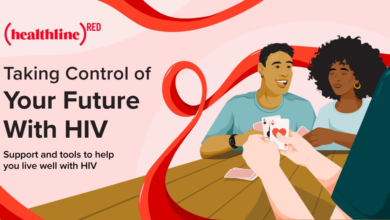No, You Don’t Need a “Big Reason” to Go to Therapy – Body Health World
[ad_1]
I’ve gone to therapy at several points in my life. The first time was after a breakup. This is actually a pretty common time to seek help — lots of people go to therapy after a big life event.
But the second time I went, I didn’t have a “big” reason.
In fact, on paper, my life was going pretty well. I’d just moved to New York — a city I’d always dreamed of living in — and I had just started a master’s program in playwriting, a subject I loved. My classes were going well and I’d just started dating the man who’d later become my husband.
And yet, even with everything seemingly going “right,” I felt sad almost every day. Writing — and almost everything else — felt like a chore. It was hard just to get up in the morning.
I didn’t know it at the time, but I was dealing with depression, a mental health condition that affects roughly
Here’s the thing about depression: It’s a mood disorder that doesn’t necessarily need a big life event to take hold of you. I’m glad I got into therapy. I needed help, even if I wasn’t sure why. And it allowed me to develop the tools I needed to get through the day.
While I eventually stopped therapy for a while, I’ve gone back at several points in my life for help with anxiety, job loss, health diagnoses, and even grief over the loss of my dog.
Yes, people might be most inclined to reach out to a therapist when they’re in crisis or during stressful life events. But the definition of “stressful life event” is a little different for everyone. We all have unique triggers and life experiences.
For example, seeking therapy after the loss of my dog got me more than one raised eyebrow from people I told.
But, says Joyce Marter, a licensed psychotherapist and founder of Urban Balance, “It’s not at all weird. For many, pets are family members and the grief and loss experienced can be similar to the loss of any other loved one.”
It’s also OK to start therapy just because you think you need a little extra help, even if you’re not sure why.
“Seeking therapy is a routine and preventive form of healthcare, like going to the dentist or the doctor,” Marter says. “A therapist is like a personal trainer for your mind and your relationships.”
Dr. Gail Saltz, a psychiatry professor at NewYork Presbyterian Hospital Weill-Cornell School of Medicine, agrees.
“Plenty of people do come to therapy to understand themselves better, to work through areas that are more difficult, and to improve their ability to thrive and cope with adversity,” she says.
“Therapy is exceedingly enhancing,” Saltz says. “I’d say that often it would be best for people to seek therapy long before the crisis occurs in their life so they would be better equipped to manage the inevitable crisis or difficulty in their lives.”
“Schedule an appointment,” Marter says. “An ounce of prevention is worth a pound of cure.”
As of 2019, nearly 1 in 5 adult Americans lived with a mental health condition, according to the
Lack of access to affordable mental health care This may be because some people are reluctant to reach out for help, either due to stigma surrounding therapy or because they don’t think their concern is “severe enough” to merit help.
“There is no ‘depressed enough’’ when it comes to seeking help, Saltz says. “If you feel depressed, chances are you can benefit from therapy.”
We’ve been living through unprecedented times since the start of the COVID-19 pandemic. And despite increased vaccination rates and hope for a return to “normalcy,” it’s OK to still feel uncertain, confused, scared, worried, numb, or anything in between.
As of writing this article, 312,771,733 million Americans have contracted COVID-19 and over half a million people have died from this novel virus, according to the Centers for Disease Control and Prevention (CDC). Even if you didn’t lose anyone close to you, you might be grieving for other reasons — maybe a missed opportunity, a life that feels like it’s on pause, or a lost job. Grieving these losses is going to take time.
Companies all across the country have laid off or furloughed millions of employees. Many of those who have kept their job are still working from home. Travel is still inadvisable. Many of us haven’t seen close friends or family for over a year.
So, yes, things are slowly returning to some version of “normal” in some places — but it’s going to take a while to recover from everything that’s happened.
“Our world was experiencing a global mental health epidemic prior to the pandemic, which has poured gasoline on the fire and brought us to a full-on world mental health crisis,” Marter says.
“We were already experiencing the highest rates of anxiety, depression, and suicide, and now people are dealing with stressors on every level — financially, relationally, emotionally, physically, environmentally, and politically,” she adds.
“Getting help is probably the more brave, smart thing to do,” Saltz says. This is just as true whether you’re experiencing a big life event or just feel like you need a little help or someone to talk with.
Marter agrees. “You will feel better after you connect with a therapist. It’s a wonderful, caring, and compassionate thing to do for yourself. Think of it as being a good parent to yourself and getting yourself the professional support you need and deserve,” she says.
Read this article in Spanish.
Simone M. Scully is a new mom and journalist who writes about health, science, and parenting. Find her on her website or on Facebook and Twitter.
[ad_2]



